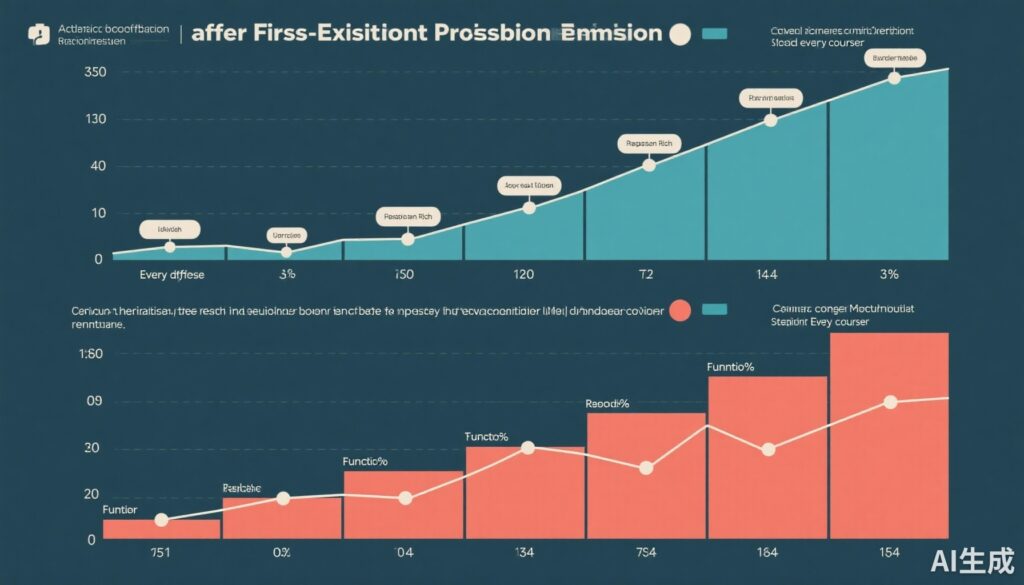Highlights
- Early dose reduction or discontinuation (DRD) after first-episode psychosis (FEP) remission increases relapse risk and reduces quality of life within the first year.
- Long-term follow-up (3–4 years) reveals improved researcher-rated functioning (GAF) and trends toward reduced symptom severity with DRD compared to maintenance therapy.
- Antipsychotic doses converged between groups after one year, suggesting DRD benefits relate to psychosis management learning rather than sustained lower medication exposure.
- Suicide risk during early DRD remains a critical safety consideration, highlighting the need to balance risks and benefits carefully.
Background
First-episode psychosis (FEP) represents a pivotal clinical stage for schizophrenia spectrum disorders and related psychoses. Early intervention with antipsychotics is critical to achieve remission; however, the optimal antipsychotic treatment duration and dosing strategies post-remission remain controversial. Long-term maintenance treatment is the standard to reduce relapse risk, but concerns about side effects, tolerability, and functional recovery motivate exploring dose reduction or discontinuation strategies.
The conflicting evidence from observational studies and smaller trials on long-term outcomes after early antipsychotic dose reduction or discontinuation (DRD) has left clinicians uncertain about balancing relapse prevention with functional recovery and quality of life. Prior meta-analyses indicated that DRD shortly after remission increases relapse risk but suggested potential benefits in cognition and psychosocial functioning, though robust long-term randomized data have been scarce.
Key Content
Chronological Development of Evidence on Antipsychotic Dose Management Post-FEP
Early randomized controlled trials (RCTs) primarily focused on relapse prevention, showing superiority of maintenance therapy over abrupt discontinuation. For example, the 2007 Wunderink et al. trial found higher relapse rates with discontinuation but improved functional recovery at 7 years, suggesting complex trade-offs.
Subsequent meta-analyses (e.g., Leucht et al., 2012; Martí-Bonmatí et al., 2019) reinforced the relapse risk from DRD but indicated heterogeneity in functional outcomes. Observational studies suggested some patients might successfully discontinue with careful monitoring, but these lacked the rigor and breadth of randomized trials.
The HAMLETT study (Sommer et al., 2025) advances the field by providing an adequately powered, pragmatic randomized trial comparing early DRD within 12 months post-remission to maintenance treatment, with extended 4-year follow-up, offering crucial insights into the temporal dynamics of outcomes.
Study Design and Population
The HAMLETT-OPHELIA consortium implemented a single-blind, pragmatic RCT in 26 specialized psychosis units across the Netherlands, enrolling 347 patients aged 18–45 years who had remitted from a first psychotic episode (FEP). Patients were randomized 1:1 to early DRD (within 12 months of remission) or maintenance treatment for 12 months, with follow-up extending to 4 years.
Primary and Secondary Outcomes
The primary endpoint was patient-rated functioning measured by the World Health Organization Disability Assessment Schedule 2.0 (WHODAS-2), providing a comprehensive assessment of daily living and participation. Secondary outcomes included researcher-rated global assessment of functioning (GAF), symptom severity via Positive and Negative Syndrome Scale (PANSS), relapse rates, quality of life, and adverse events including serious adverse events (SAEs).
Results Overview
– Short-Term Risks: Within the first year, the DRD group experienced a significantly higher relapse risk (Odds Ratio 2.84, 95% CI 1.08-7.66) and decreased quality of life compared to maintenance.
– Primary Outcome: No significant time-by-treatment interaction on WHODAS-2 was observed, indicating patient-rated functioning did not differ significantly.
– Long-Term Functional Gains: At 3 and 4 years, DRD participants exhibited significantly better researcher-rated global functioning (GAF) and showed trends toward lower symptom severity (PANSS).
– Medication Dose Convergence: After 1 year, antipsychotic doses were comparable between groups, suggesting improved outcomes in DRD did not stem from sustained dose reduction.
– Safety Outcomes: Rates of SAEs and adverse effects were similar; however, 3 suicides occurred in the DRD group versus 1 in maintenance, underscoring safety concerns.
Integrated Interpretation of HAMLETT and Prior Studies
The HAMLETT trial aligns with previous findings that early DRD carries elevated short-term relapse risk, which may negatively impact patient-reported quality of life. However, the detection of improved longer-term, researcher-rated global functioning and symptom trends suggests a complex interplay where patients might develop better coping mechanisms and medication management skills over time.
This finding refines the lens on DRD strategies: while a short-term increased vulnerability period exists, careful supervised DRD may empower patients to actively engage in illness self-management and functional recovery, potentially optimizing long-term outcomes.
Expert Commentary
The HAMLETT trial addresses a pivotal clinical dilemma with pragmatic rigor. The nuanced temporal outcome profile—transient risk balanced by longer-term functional benefit—calls for personalized, shared decision-making in antipsychotic management post-FEP.
Clinical guidelines (e.g., APA, NICE) currently favor maintenance treatment post-FEP due to relapse risk but increasingly recognize the importance of functional recovery and patient autonomy. These results suggest that under specialized care and careful monitoring, selective early dose reduction or discontinuation can be cautiously attempted.
Noteworthy concerns include the elevated suicide risk during early DRD phases, emphasizing the critical need for vigilant risk assessment, psychosocial support, and crisis management. Moreover, the discrepancy between patient-rated (WHODAS-2) and researcher-rated (GAF) functioning highlights methodological complexities in outcome assessment that merit further investigation.
From a mechanistic perspective, reduced antipsychotic exposure can mitigate adverse effects contributing to functional impairment (e.g., cognitive blunting, metabolic side effects), possibly facilitating neurocognitive and psychosocial recovery pathways. Moreover, the learning component alluded to by investigators may reflect enhanced patient insight, self-management skills, and adaptive medication use.
Limitations include the single-blind design and generalizability limited to Dutch specialized services. Future studies might focus on biomarkers or predictive analytics to identify candidates for safe DRD and incorporate patient-centric outcomes.
Conclusion
The HAMLETT randomized clinical trial provides robust long-term data that early dose reduction or discontinuation of antipsychotics after FEP remission increases short-term relapse risk and decreases quality of life initially but leads to better global functioning at 3 and 4 years. This functional benefit appears independent of sustained dose differences, possibly reflecting enhanced psychosis management learning.
Clinicians should weigh the empowering potential of early DRD against its immediate risks, ensuring shared decision-making supported by close monitoring and psychosocial interventions. The study underscores the need to individualize post-FEP antipsychotic strategies within a supportive clinical framework, aiming to optimize recovery trajectories beyond symptom suppression alone.
References
- Sommer IE, de Beer F, Gangadin S, et al. Early Dose Reduction or Discontinuation vs Maintenance Antipsychotics After First Psychotic Episode Remission: A Randomized Clinical Trial. JAMA Psychiatry. 2025;1:e252525. doi:10.1001/jamapsychiatry.2025.2525. PMID: 41032294; PMCID: PMC12489793.
- Wunderink L, Nieboer RM, Wiersma D, Sytema S, Nienhuis FJ. Recovery in remitted first-episode psychosis at 7 years of follow-up of an RCT of dose reduction/discontinuation of antipsychotics. Am J Psychiatry. 2007 Nov;164(6):913-9. doi:10.1176/ajp.2007.164.6.913.
- Leucht S, Tardy M, Komossa K, et al. Maintenance treatment with antipsychotic drugs for schizophrenia. Cochrane Database Syst Rev. 2012 May 16;(5):CD008016. doi:10.1002/14651858.CD008016.pub2.
- Marín-Guerrero AC, Martí-Bonmatí L, et al. Early antipsychotic dose reduction or discontinuation versus maintenance treatment in schizophrenia spectrum disorders: Systematic review and meta-analysis. Schizophr Res. 2019;212:23-32. doi:10.1016/j.schres.2019.05.016.
- NICE (National Institute for Health and Care Excellence). Psychosis and schizophrenia in adults: prevention and management. Clinical guideline [CG178]. 2014. Available at https://www.nice.org.uk/guidance/cg178.

